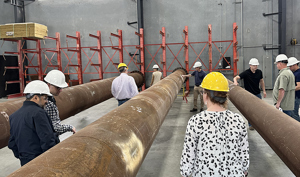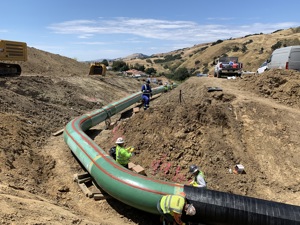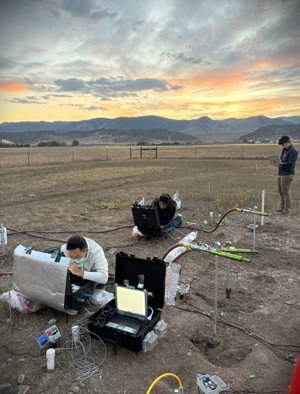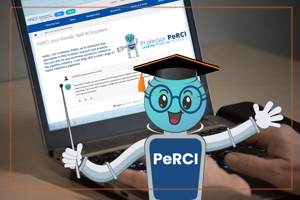AI-Powered Assistant Helps PRCI Drive Pipeline Technology Innovation
ANITA VIGILANTE, Communications Specialist, PRCI
(P&GJ) — In today’s landscape, true progress does not always mean inventing everything from scratch. The most innovative steps forward often come from rediscovering proven practices, lessons and knowledge that may have been overlooked or forgotten.
Building on the past avoids repeating the same challenges. The Pipeline Research Council International’s (PRCI’s) commitment is not only to break new ground but also to ensure that the collective wisdom of the industry’s past is easily accessible and applied to current and future challenges.
The PRCI continues to be a global leader in advancing the research and development of applicable solutions for the pipeline industry. With the increasing complexity of energy infrastructure, the PRCI’s collaborative approach to research is more vital than ever, enabling safer, more efficient and more innovative solutions for the pipeline industry.
This year, the PRCI is making groundbreaking strides through its active technical committees, high-impact projects and rich repository of industry insights. To enhance accessibility to this wealth of knowledge, PRCI recently launched an artificial intelligence (AI)-powered assistanta, designed to help professionals efficiently extract information and insights from its vast resource library.
Leading the way. The PRCI’s unique structure is built on collaboration between its member organizations, such as pipeline operators, standards-developing and other non-profit industry associations, engineering firms, service providers, manufacturers and regulators. This collective expertise fuels robust technical committees focused on addressing the key challenges of our time.
Executive Director of Research, Gary Choquette explained, “At PRCI, we recognize that the future of pipeline technology isn’t just about inventing something entirely new—it’s about refining the knowledge we’ve built over decades.”
With a career that has included roles from hands-on engineering to leadership, from PRCI Member delegate to PRCI staff leadership, Choquette is passionate about advancing pipeline safety, reliability and innovation through collaborative research and knowledge transfer (FIG. 1).

The PRCI’s technical committees are at the heart of its mission, driving research and innovation in various critical areas. These committees are closely aligned with the pressing needs of the pipeline industry, including topics such as integrity and inspection, operations and maintenance and facility design (FIG. 2).
“By identifying gaps in our understanding and collaborating with the brightest minds in the industry, we ensure that our research not only solves today’s challenges but also builds on the foundational principles that have stood the test of time,” Choquette continued. “This approach allows us to innovate responsibly, ensuring safety, reliability and efficiency for the pipeline systems that our modern society depends on.”
The PRCI’s portfolio boasts projects designed to respond to some of the sector’s most urgent questions. This year’s Research Roadmap includes various collaborative projects aimed at sustainability, safety and emerging challenges. The Integrity and Inspection Committee, for instance, is making advancements in inline inspection technologies to improve flaw detection accuracy. Meanwhile, the Surveillance, Operations and Monitoring Committee is confronting methane emissions reduction with practical, implementable and measurable solutions.

Other highlights include innovative research into hydrogen compatibility with existing pipeline materials, essential for progressing toward sustainable energy initiatives. Work on advanced leak detection methods is aimed at enhancing safety and public trust in pipeline infrastructure. Additionally, PRCI continues to support industry transformation by funding essential tools, from benchmarking reports to new training modules, allowing member organizations to stay ahead of the curve (FIG. 3).
Wealth of resources. With this wealth of industry knowledge, the PRCI maintains an extraordinary library of resources to support its members and the broader pipeline industry.
Executive Director of Knowledge Transfer, Shahani Kariyawasam observed, “Knowledge transfer is the cornerstone of progress in our industry. By sharing expertise, research and experience, we empower professionals to build safer and more efficient pipelines.”
By making these resources available, the PRCI helps the industry reconnect with valuable knowledge and time-tested best practices, equipping professionals to address modern challenges with confidence.

Engineers, managers and decision-makers alike can access a wide array of materials, including detailed research reports, white papers, technical webinars and various training courses. These resources focus on pipeline safety, materials science, environmental impact and cutting-edge technology. With so much available, the challenge has often been about navigating this expansive collection.
An AI-powered virtual assistant. Launched publicly in September 2025, the PRCI’s AI-powered virtual assistanta improves how professionals access and utilize PRCI’s catalogue. Built to provide quick and precise answers, the platform simplifies how industry professionals approach complex questions about pipeline technology, safety and emerging trends (FIG. 4).
It is a large language model (LLM) AI system that enables users to rediscover insights and practical solutions that exist within the PRCI’s expansive archive. It bridges the gap between cutting-edge research and foundational wisdom, ensuring that users can draw on new innovations and the established learnings that have shaped the industry.
The virtual assistant can quickly locate relevant reports, studies or training material based on user queries. Whether searching for the latest research on hydrogen pipeline compatibility or for a guide to implement advanced leak detection strategies, it saves hours of manual searching by delivering curated, authoritative information in seconds and provides a direct link to the referenced materials.
User-friendly and accessible first to all PRCI members, the interface means that even those who are unfamiliar with AI tools can use it effectively. Furthermore, it is designed to continuously improve as more people interact with it, improving its ability to provide accurate, meaningful answers over time. The public version of the platform launched on Sept. 16, making this resource available to any stakeholder.
The PRCI’s work reinforces a powerful idea: the future of pipeline innovation isn’t just about inventing everything new, it’s about reconnecting with and applying the valuable insights we may have overlooked. This positions PRCI as the leading resource for peer-reviewed research, offering trusted, science-backed solutions supported by the industry’s top expertise and operator insights.
Whether it’s technology, sustainability or expert training, the PRCI’s deep well of resources empowers the industry not just to advance, but to rediscover proven solutions and adapt them to today’s needs.
NOTE
a PRCI’s Professor PeRCI

